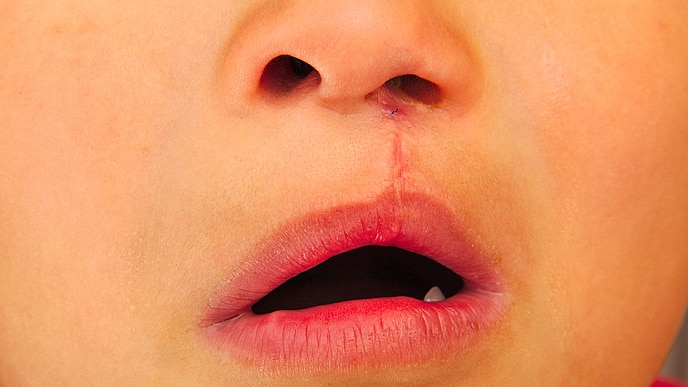What is Velocardiofacial Syndrome?
Velocardiofacial syndrome (VCFS) is a disorder that has been associated with over thirty different features. (A disease or disorder that has more than one identifying feature or symptom is a syndrome.) The name velocardiofacial syndrome comes from the Latin words "velum" meaning palate, "cardia" meaning heart and "facies" having to do with the face. Not all of these identifying features are found in each child who is born with VCFS. The most common features are cleft palate (opening in the roof of the mouth), heart defects, characteristic facial appearance, minor learning problems and speech and feeding problems.
Although VCFS is the most common syndrome associated with a cleft palate, it was not recognized until 1978, at which time Dr. Robert J. Shprintzen of the Center for Craniofacial Disorders at the Montefiore Medical Center in Bronx, New York, described 12 children with the disorder. Most or all of these first 12 children were born with a cleft palate, heart defects and similar faces. VCFS may also be known as Shprintzen syndrome, DiGeorge syndrome, Craniofacial syndrome or Conotruncal Anomaly Unusual Face Syndrome.
What Causes Velocardiofacial Syndrome?
The cause of VCFS is unknown. What is known is that it is a genetic disorder. This means that there is a problem with one or more of the genes which are found in every cell of the body that contain the instructions that tell cells what to do. Although the gene or genes that cause VCFS have not been identified, most of the children who have been diagnosed with this syndrome are missing a small part of chromosome 22. Chromosomes are threadlike structures found in every cell of the body. Each chromosome contains hundreds of genes. A human cell normally contains 46 chromosomes (23 from each parent). The location or address of the missing segment in individuals with VCFS is 22q11. As a result of this deletion, some of the genes are absent from this chromosome.
Scientists and physicians know that VCFS is an autosomal dominant disorder. This means that only one parent needs to have the gene for VCFS in order to pass it along to their children. When one of the parents has VCFS the chance of their children having the syndrome is one in two or about 50/50 for each birth. Research has revealed, however, that VCFS is inherited in only about 10 to 15 percent of the cases. In most instances, neither of the parents has the syndrome or carries the defective gene and the cause of the deletion is unknown.
What are the Features of Velocardiofacial Syndrome?
Despite the involvement of a very specific portion of chromosome 22, there is great variation in the features of this syndrome. At least 30 different problems have been associated with the 22q11 deletion. None of these problems occur in all cases. The list includes: cleft palate, usually of the soft palate (the roof of the mouth nearest the throat which is behind the bony palate); heart problems; similar faces (elongated face, almond-shaped eyes, wide nose, small ears); learning difficulties; eye problems; feeding problems that include food coming through the nose (nasal regurgitation) because of the cleft palate; middle-ear infections (otitis media); hypoparathyroidism (low levels of the parathyroid hormone that can result in seizures); immune system problems which make it difficult for the body to fight infections; weak muscles; short height; curvature of the spine (scoliosis); and tapered fingers. Children are born with these features which do not worsen with age.
How Common is Velocardiofacial Syndrome?
Cleft palate is the fourth most common birth defect affecting approximately one of every 700 live births. VCFS occurs in approximately five to eight percent of children born with a cleft palate. It is estimated that over 130,000 individuals in the United States have this syndrome.
Where Can I Get Additional Information?
American Academy of Otolaryngology - Head and Neck Surgery (AAO-HNS)
One Prince Street
Alexandria, VA 22314
Voice: (703) 836-4444
TTY: (703) 519-1585
FAX: (703) 683-5100
E-mail: webmaster@entnet.org
Internet: www.entnet.org
American Cleft Palate-Craniofacial Association (ACPA)
104 S. Estes Drive
Suite #204
Chapel Hill, NC 27514
Voice: (919) 933-9044
Toll free: (800) 24-CLEFT
FAX: (919) 933-9604
E-mail: cleftline@aol.com
Internet: www.cleftline.org
American Heart Association
7272 Greenville Avenue
Dallas, TX 75231-4596
Voice: (214) 373-6300
TTY: (800) 654-5984
Toll free: (800) 242-8721
FAX: (214) 706-2221
Internet: www.americanheart.org
American Society of Human Genetics
9650 Rockville Pike
Bethesda, MD 20814-3889
Voice: (301) 571-1825
FAX: (301) 530-7079
American Speech-Language-Hearing Association (ASHA)
10801 Rockville Pike
Rockville, MD 20852
Voice: (301) 897-5700
TTY: (301) 897-0157
Toll free: (800) 638-8255
FAX: (301) 571-0457
E-mail: actioncenter@asha.org
Internet: www.asha.org
Children's Craniofacial Association (CCA)
P.O. Box 280297
Dallas, TX 75228
Voice: (972) 994-9902
Toll free: (800) 535-3643
FAX: (972) 240-7607
Internet: www.ccakids.com
FACES-National Craniofacial Association
P.O. Box 11082
Chattanooga, TN 37401
Voice: (423) 266-1632
Toll free: (800) 3FACES3
FAX: (423) 267-3124
E-mail: faces@mindspring.com
Internet: www.faces-cranio.org
National Foundation for Facial Reconstruction
317 East 34th St. #901
New York, NY 10016
Voice: (212) 263-6656
FAX: (212) 263-7534
E-mail: nffr@earthlink.net
Internet: www.nffr.org
National Institute of Child Health and Human Development
Building 31, Room 2A32
31 Center Drive MSC 2425
Bethesda, MD 20892-2425
Voice: (301) 496-5133
Toll free: (800) 370-2943
FAX: (301) 496-7102
E-mail: NICHDClearinghouse@mail.nih.gov
Internet: www.nichd.nih.gov
National Institute of Dental and Craniofacial Research
Building 45, Room 4AS-19
45 Center Drive MSC 6401
Bethesda, MD 20892-6401
Voice: (301) 496-4261
FAX: (301) 496-9988
E-mail: nidrinfo@od31.nidr.nih.gov
Internet: www.nidcr.nih.gov
National Organization for Rare Disorders (NORD)
P.O. Box 8923
New Fairfield, CT 06812
Voice: (203) 746-6518
TTY: (203) 746-6927
Toll free: (800) 999-NORD
FAX: (203) 746-6481
E-mail: orphan@rarediseases.org
Internet: www.rarediseases.org
Velo-Cardio-Facial Syndrome Educational Foundation
c/o Robert J. Shprintzen, Ph.D.,
Executive Director
SUNY Upstate Medical University
750 East Adams Street
Jacobsen Hall, Room 708
Syracuse, NY 13210
Voice: (315) 464-6590
FAX: (315) 464-6593
E-mail: info@vcfsef.org
Internet: www.vcfsef.org












